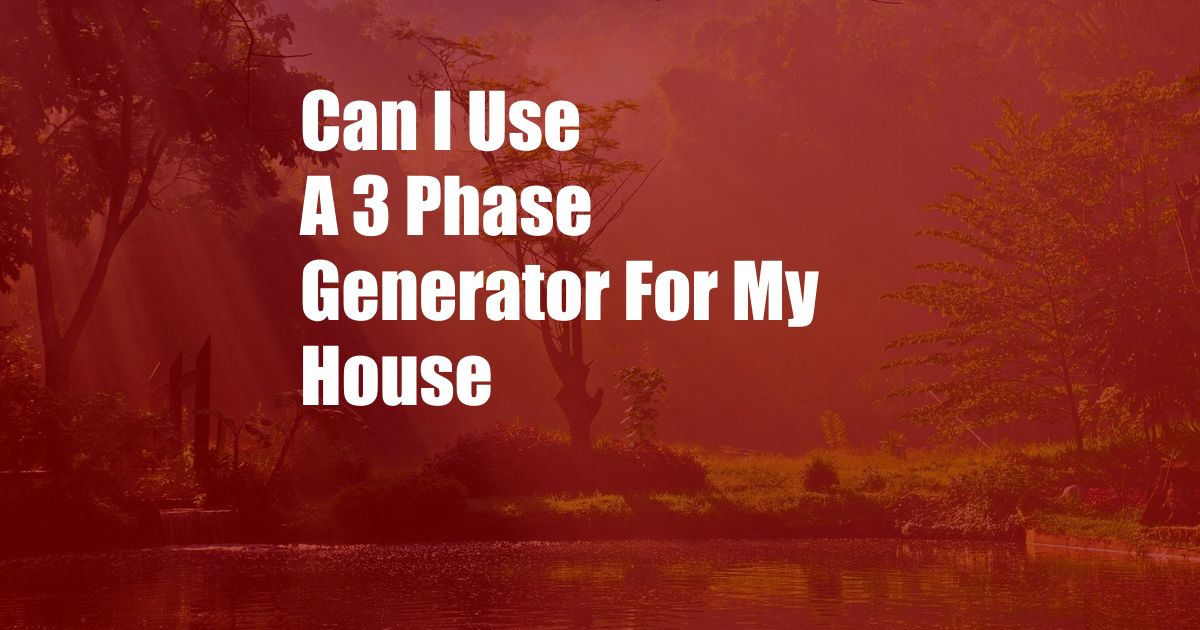
Can You Use a 3-Phase Generator for Your House?
In the midst of a power outage, your household appliances yearn for a reliable source of electricity, leaving you wondering if a 3-phase generator can fulfill that role. Let’s delve into the intricacies of 3-phase generators and their compatibility with residential settings.
The key to understanding 3-phase generators lies in their ability to produce three alternating current (AC) waveforms, each offset by 120 degrees. This sophisticated electrical architecture enables them to deliver more power efficiently than their single-phase counterparts. However, most residential homes utilize single-phase power, posing the question of whether 3-phase generators can adapt to these circumstances.
Compatibility Challenges
The fundamental challenge stems from the mismatch between the 3-phase output of the generator and the single-phase electrical system of most homes. This incompatibility can lead to severe equipment damage if not addressed properly.
To ensure safe and effective operation, a crucial step involves installing a special transformer known as a phase converter. This device skillfully transforms the 3-phase power into single-phase, allowing your appliances to function harmoniously with the generator’s output.
Phase Converter Options
The realm of phase converters offers two primary options, each tailored to specific requirements:
- Static Phase Converter: Constructed with capacitors and inductors, this converter serves as an economical choice for smaller loads and basic household needs.
- Rotary Phase Converter: Employing an electric motor, this converter provides superior power handling capabilities, making it suitable for heavy-duty loads and specialized equipment.
Expert Advice
When contemplating the use of a 3-phase generator for residential purposes, consulting with a qualified electrician is paramount. They possess the expertise to assess your specific electrical needs, recommend the appropriate phase converter, and ensure a seamless integration into your home’s electrical system.
Additionally, meticulous attention to safety precautions is crucial. Improper installation or operation can lead to electrical hazards, jeopardizing both your safety and the integrity of your equipment. Always adhere to the manufacturer’s instructions and seek professional assistance when in doubt.
Frequently Asked Questions (FAQs)
- Q: Can I directly connect a 3-phase generator to my home?
A: No, a phase converter is necessary to transform the 3-phase power into single-phase for compatibility with your home’s electrical system. - Q: Which type of phase converter is best for residential use?
A: Static phase converters are generally sufficient for most household applications, while rotary phase converters are recommended for heavy-duty loads or specialized equipment. - Q: How do I choose the right size phase converter?
A: Determine the total electrical load of your appliances and select a phase converter with a capacity that exceeds this load by at least 20-25% to ensure adequate power delivery.
Conclusion
Harnessing the power of a 3-phase generator for residential use requires careful consideration and expert guidance. By understanding the potential challenges and employing the appropriate phase converter, you can effectively adapt this powerful energy source to meet the electrical demands of your home. Whether faced with extended power outages or simply seeking a reliable backup power solution, a 3-phase generator, coupled with the right expertise, can provide peace of mind and uninterrupted electricity.
Are you contemplating the use of a 3-phase generator for your home? Share your thoughts and experiences in the comments below.